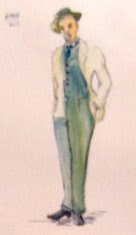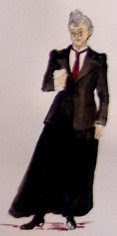Everyone's a critic:
Wilde, Chekhov and their detractors, otherwise known as "mildew."
Ah, my dear, gentle reader! I must say, I have been trying to balance a relationship with two very demanding men this summer, and I am exhausted: Oscar Wilde and Anton Chekhov.
How can they be so demanding when they are both dead? It doesn't matter, gentle reader, men are men. Dead, alive, or somewhere in between, they are time consuming. Men in the theater are even worse. I dramaturged Oscar's An Ideal Husband, and now I am dramturging Anton's Uncle Vanya. Let me assure you, gentle reader, these men were--and are--a handful. They have relentlessly kept me up for many a sleepless night this summer. My grandmother Leadlay (God rest her) used to always say, "Just remember, dear, men get older, but they never grow up. Never." She usually whispered this to me while my grandfather was in the process of doing something extremely silly, or, more usually, something to attract attention to himself. My grandfather was a natural born actor and the world was his stage. He never met a stranger, and was always "acting out" in ways that won him many fans, and completely wore out my grandmother, who often found his antics a little embarrassing.
Grandma's wisdom is doubly true of men in the theatrical profession: Many never grow up. Both Oscar and Anton were quite a handful in their day, and working on their plays still keeps you on your toes. I mean, really, just try to imagine the lives of Constance Wilde (Oscar's wife) or Olga Knipper (Anton's). Oscar led a double life that eventually ruined not just his own, but also Constance's. On the other hand, poor, handsome Anton, ever the somewhat emotionally unavailable, constant bachelor, played the field for years leaving many a broken heart. When he finally settled down (predictably with a younger woman), he promptly died four years later from TB after a long, sad goodbye.
Oscar and Anton were contemporaries. Oscar was born in Dublin, Ireland in 1854. Anton was born in Taganrog, Russia in 1860. Oscar died penniless from cerebral meningitis in 1900, in exile in France, living under the name Sebastian Melmoth. Anton died in 1904 in his wife's arms after downing a glass of champagne and announcing in German to his wife (of German descent) and his doctor (also German), "Ich sterbe" (I am dying). He was at a spa in Badenweiler, Germany at the time, trying to recover from the tuberculosis that killed him. Both men, so close in age, and such colossal geniuses, were like meteors: They flamed brightly and far too briefly across our horizon, but oh, how they shined!
Oscar and Anton never met, which is just as well. I have the sneaking suspicion Chekhov would not have liked Wilde. Chekhov believed in gentlemanly manners and did not approve of acting out in public, and Wilde was always and forever acting out. Wilde was the kind of guy you could party with till the wee hours of the morning, and have a great time. The next day, however, you might be a bit mortified with yourself, and vow not return anymore of his calls--or call him--ever again. He was like the Pied Piper of bad behavior in that way, I think. Chekhov, on the other hand, was the kind of guy you'd fall hopelessly in love with and quietly pine over for years. You'd never dare tell him because even if you did, you'd get no discernible or satisfactory reaction from him. He'd cough (you know, because of the TB), smile sadly, and apologize for your misplaced affection without actually naming what he was apologizing for. Anton could have been a character in Jane Austen's Persuasion--there's a lot of pining in that novel. Better still, he could have been one of the tall, handsome, unknowable bachelors in a Gothic novel by a Brontë sister. More than one lady worked herself into an unrequited love melancholia over the tall, beautiful, distant Chekhov. (Personally, I think pining is underrated in our instant-gratification-based society. I like to pine. Anticipation is so much better than reality, anyway. Pining is possibility. Reality is disappointing.)
Sooo, Oscar and Anton were very different men. Yet working on plays by these two all in the same summer has raised some interesting parallels in my mind: about the difficult life of a writer, about the nature of fame and genius, about humor (as both were known for their humorous tales), about dying young, and about the relationship between the artist and the critics.
Unfortunately, not everyone valued Wilde and Chekhov as playwrights in their lifetimes, although we speak of them today in reverent tones. There were no such phrases like "Chekhovian" or "Wildean" in the critical pantheon of pat comparisons with which to skewer younger, less established writers. At the time, they were the less established writers, and they were the ones receiving the skewering. Chekhov would probably be astonished at how he is revered today. He was a humble man, and always the first to point out what he perceived as the failings of his own work. Oscar would not be surprised at his current status at all. Oscar would wonder what the hell took us all so long to recognize his genius.
It is a wonder either man continued writing plays at all when one considers the public beating they took in the press. Let us, gentle reader, peruse a few examples. I will give the names of the odious critics, when available, as they deserve to be derided, albeit posthumously. They should not have been so rude to my Oscar and my Anton. Dramaturgs love their writers, quite passionately. We'll go to the mat for them. Dramaturgs do not like their writers to take a beating. We take it personally. We hold grudges. We use our pens to get even. Put on your flak jacket, gentle reader, it's about to get ugly!
When An Ideal Husband opened in 1895, certain English critics lined up to say mean things about Oscar the Irishman and his play. H.G. Wells (yes, the guy who wrote The Time Machine) wrote a review for the Pall Mall Gazette in which he opined,
So much for the play. It is not excellent, indeed, after Lady Windermere's Fan and The Woman of No Importance, it is decidedly disappointing. But worse have succeeded, and it was at least excellently received. It may be this melodramatic touch, this attempt at commonplace emotions and the falling off in epigram, may be merely a cynical or satirical concession to the public taste…But taking it seriously…the play is unquestionably very poor.
Notice that not only does Wells slam the play, he slams the audience for liking it. Interestingly, he did not sign his review. It was published anonymously, which shows he didn't have the "oysters" to own his opinions. Too bad his time machine wasn't real; he needed to be beamed away.
A.B. Walkey also had nasty things to say in Speaker: "Mr. Wilde's play will not help the drama forward a single inch, nor--though that is a comparatively unimportant matter--will it, in the long run, add to Mr. Wilde's reputation…the fact remains that Mr. Wilde's work is not only poor and sterile, but essentially vulgar." Walkey also didn't use his full name, publishing as A.B.W. I think we can all get a giggle now over Walkey's entirely anal, uptight prognostications. Nowadays, we all know the name Oscar Wilde, but who gives a cat poo about A.B. Walkey? "Who," you ask? Exactly, gentle reader. "Who" indeed!
Even William Archer, one of the premier English critics of the day, was a real jerk about Oscar and An Ideal Husband. He wrote that the play, "…does not positively lack good things, but simply suffers from a disproportionate profusion of inferior chatter." He may have been the premier critic of his day, but only theater historians remember the name William Archer, and we don't remember it without ambivalence. As a critic, Archer did not positively lack good insights, but his work suffered from a disproportionate profusion of inferior blah-blah-blah. (Yes, I did wear an evil grin as I wrote that last sentence.)
Chekhov also took a beating when he first introduced his plays to the stage. Tales of the disaster that was the opening night of The Seagull in St. Petersburg are the stuff of theatrical legend. Unfortunately, they are true. Audiences and critics alike lined up to hate the play and heap abuse on the author. Chekhov ran home in the middle of opening night. A friend later found him curled in a fetal position in bed where he cried out, "I implore you, no lights! I don't want to see anybody. I only want to tell you this: let them call me a-------- if I ever write for the theater again." Thankfully, he did.
Poor Chekhov even had to endure negative criticism from his good friend and idol, Tolstoy (yes, the author of War and Peace). Tolstoy read The Seagull and wrote to Chekhov, "It is absolutely worthless: It is written like Ibsen's drama…You know that I don't like Shakespeare, but your drama, dear Anton Pavlovich, is even worse than his." Tolstoy may have been a great novelist, but he was a nut job. Keep in mind that this is the man who also thought that the only way to improve the human soul was to give up carnal desire and quit having sex. He wins a Darwin award for that one. (And he didn't like Shakespeare? See what I mean? Total wingnut!)
The point is, gentle reader, Oscar and Anton succeeded despite the drama critics. I wonder how many other Chekhovs or Wildes we have lost, who never wrote again due to the snarky opinions of some small-minded cretin with a poison pen and a printing press? As a dramaturg, I've seen first-hand the crater left in the soul of more than one extremely talented, emerging playwright after they were napalmed in the press by a critic who thinks every new play should be judged against the masterpieces of a golden oldie like Wilde or Chekhov. They don't seem to realize that a writer is not born to this stature: One becomes a Wilde or a Chekhov, usually after one is dead, and in spite of what the papers wrote of your plays when they first premiered. Thank heaven Oscar and Anton had enough inner fortitude to keep at it. Imagine all we would have lost if they had taken the criticisms to heart and quit writing. I think I'll give my beloved Anton the last word here. He once wrote of the critics who initially ranted and raged against The Seagull, "They are not men, but a kind of mildew."
Till later, gentle reader,
I am ever your,
Dr. Laura, Resident Dramaturg and Shoe Aficionado
P.S. I bought 2 new pairs of shoes at the Macy's 4th of July sale. They are fabulous.
 So here I am, ostensibly blogging for Cal Shakes, I'm 3 weeks into the rehearsal process of Uncle Vanya, and have not blogged one single letter of the process................
So here I am, ostensibly blogging for Cal Shakes, I'm 3 weeks into the rehearsal process of Uncle Vanya, and have not blogged one single letter of the process................




















